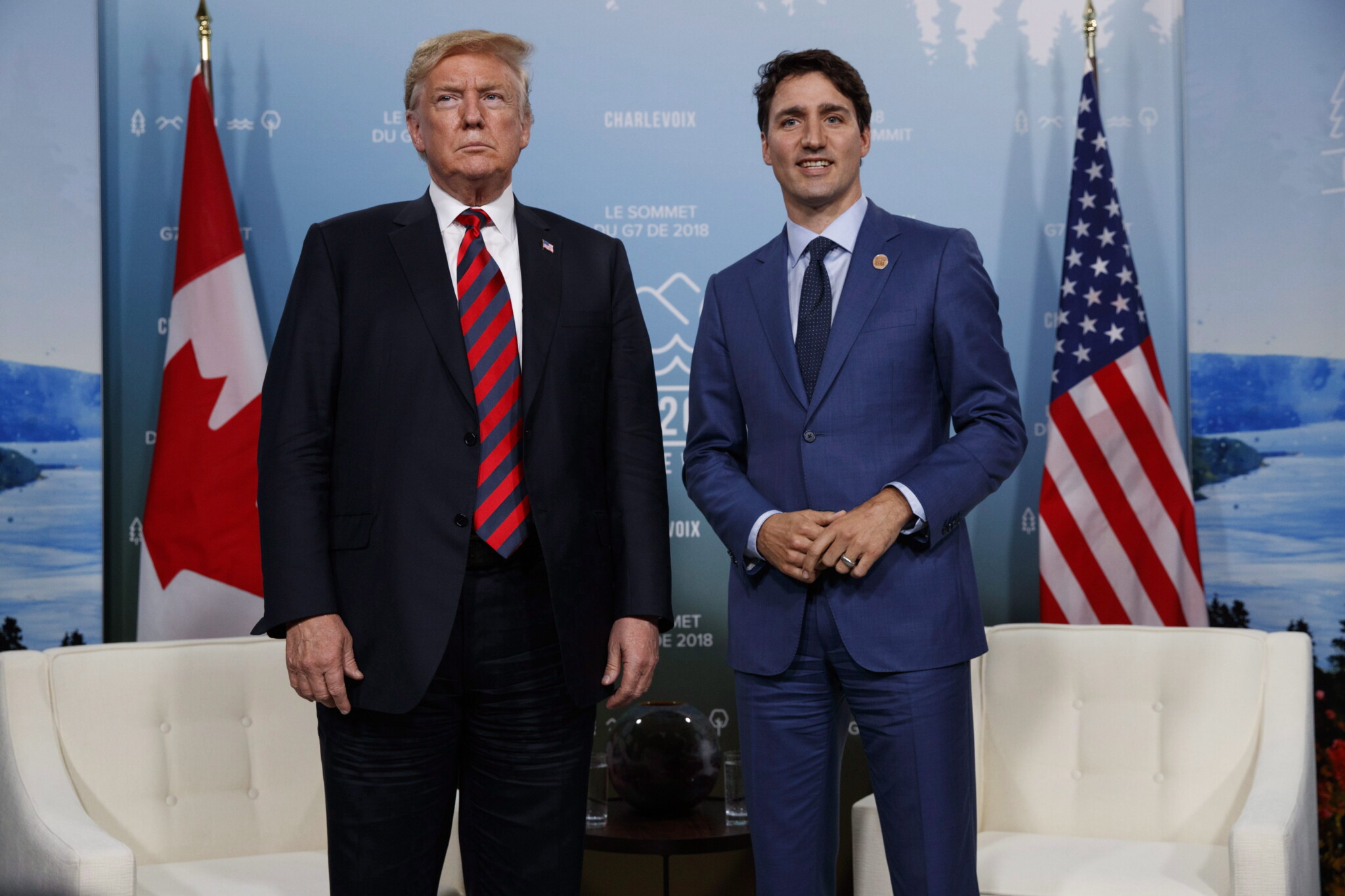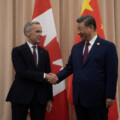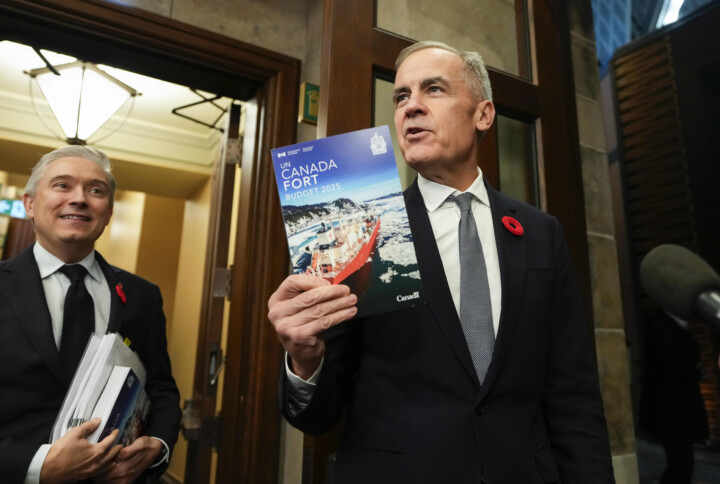In this week’s episode of In Conversation with David Frum, author and journalist David Frum spoke to editor-at-large Sean Speer about Donald Trump’s re-election and the Canadian implications of his return to the White House.
Here are five key pieces of advice Canada could take from their discussion.
1. Here come the tariffs
Trump’s electoral victory signals potential changes to the North American trade landscape, particularly if he pursues aggressive tariffs. Trump has long viewed trade as a zero-sum game, where one country gains only by the other’s loss, and his approach could disrupt existing agreements and reshape North America’s trade dynamics.
This protectionist stance may force Canada into difficult decisions regarding the USMCA (United States-Mexico-Canada Agreement), potentially transforming it into a more restricted and protectionist bloc, which could limit Canada’s trade freedoms with the rest of the world.
If Trump’s trade policies increase tariffs or introduce other trade barriers, Canadian industries—especially those dependent on the U.S. market—might suffer significant challenges, as increased tariffs could reduce Canadian exports, raise costs, and drive up prices for Canadian consumers. These changes could also limit Canada’s bargaining power on the global stage, affecting various sectors, from natural resources to agriculture.
As Frum notes, Canada’s economic relationship with the U.S. has generally allowed flexibility in trading with other nations. But, under a protectionist U.S. administration, Canada may face a tough choice between maintaining access to the U.S. market or engaging freely with other global markets.
2. Expect migrants on our border
Immigration remains a complex and politically charged issue in both the U.S. and Canada, with significant implications for cross-border relations. Under President Biden, immigration policies shifted away from the stricter Trump-era restrictions, leading to higher levels of unauthorized immigration—a decision that Frum believes harmed Biden politically.
Trump’s return could bring back more restrictive immigration policies and could lead to increased deportations and crackdowns, which could prompt an influx of migrants seeking asylum in Canada. Frum predicts that a strict immigration policy under Trump might drive tens of thousands of migrants, particularly from countries like Venezuela and Haiti, to cross the U.S.-Canada border, seeking refuge in Canada.
This shift could test Canada’s immigration infrastructure, potentially leading to increased backlogs and strain on Canadian social services. Frum suggests that Canada may need to prepare for a surge in border crossings and adapt its policies to respond to changing U.S. immigration dynamics. The broader issue, he argues, centres around balancing lawful immigration with humanitarian considerations and ensuring that Canada’s immigration policies are prepared for increased demand in response to U.S. policy shifts.
3. Canada must step up on defence
Frum warns that Trump’s potential foreign policy could have serious ramifications for national security and defence alliances, particularly for NATO and U.S.-Canada relations. Trump’s ambivalence toward NATO, combined with his likely disengagement from Ukraine, could weaken the alliance and reduce Canada’s security umbrella.
Historically, Canada has relied on the U.S. for both direct defence and as a leading force within NATO. Under a new Trump administration, Frum suggests, the U.S. might deprioritize NATO’s collective defence responsibilities and instead adopt a more isolationist stance, which could destabilize Canada’s security position.
If the U.S. withdraws support from Ukraine, Frum argues, it would signal to adversaries that the U.S. is reluctant to defend democratic nations, which could embolden countries like Russia. For Canada, this potential shift would necessitate rethinking its defence strategy, possibly increasing its defence budget and taking a more assertive role within NATO and other alliances. A weakened NATO and U.S. withdrawal from global security commitments could prompt Canada to strengthen its independent defence policies. The overarching message is that Trump’s stance may destabilize longstanding security arrangements, forcing Canada to adjust its foreign policy to counter emerging threats.
4. Climate change policy will be rolled back
Trump’s return to office is expected to lead to a rollback in U.S. climate action, with substantial effects on North American and global climate policy. As Frum points out, Trump’s administration is likely to deprioritize green energy initiatives and ease restrictions on fossil fuels, which could reduce U.S. pressure on Canada to accelerate its own energy transition.
For Canada, this could yield short-term benefits for its oil and gas sector, particularly for regions reliant on fossil fuel exports, like Alberta. However, a decrease in U.S. climate change commitments could stall progress on critical cross-border climate initiatives, weakening joint efforts to lower emissions.
Frum suggests that Canada will need to reassess its climate policies in light of these developments, balancing economic gains from a relaxed climate agenda with the long-term impacts on its international climate commitments and reputation. Should the U.S. shift its policies, Canada might face domestic and international pressure to maintain its own climate goals independently. Overall, a U.S. retreat from green energy would challenge Canada’s climate leadership and could shift the North American energy landscape back toward fossil fuel reliance.
5. Canadian conservatives must differentiate themselves from American conservatives
Trump’s brand of right-wing populism has redefined the Republican Party, emphasizing nationalism, protectionism, and anti-establishment rhetoric. It’s a shift that could influence conservative politics in Canada. Frum notes that Canadian conservatives may feel pressure to emulate Trump’s populist style to appeal to an increasingly polarized electorate. In particular, conservative leaders like Pierre Poilievre may face scrutiny as Liberals attempt to associate them with Trump.
Frum warns that while Trumpian populism might energize certain voter bases, it risks alienating moderates who find this approach divisive. He argues that Canadian conservatives should focus on respectful discourse, inclusivity, and pragmatic policy ideas rather than emulating Trump’s confrontational approach. By diversifying candidates and avoiding overt protectionism, Canadian conservatives can differentiate themselves from the more extreme elements of right-wing populism.
At the same time, the growing appeal of populism reflects a broader dissatisfaction with globalization and traditional economic policies, necessitating a careful balance. Frum emphasizes that while Trumpian populism is reshaping conservative movements globally, Canadian conservatives must be cautious, ensuring their policies and tone remain distinct to avoid alienating centrist voters.
You can listen to the full episode here.
ChatGPT assisted in the creation of this article.








